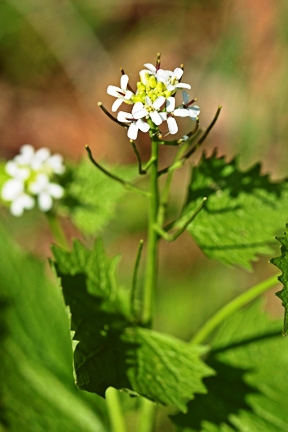
As any naturalist knows, sometimes nature calls the shots, so when the Roanoke Valley Master Naturalists had to cancel a planned outing to pull invasive garlic mustard on Poor Mountain, the message was matter-of-fact: “Good morning – for ducks and sleeping. Translation: We won’t pull mustard today due to the weather. Enjoy your day and our much-needed rain.”
But the rescheduling notice arrived with a bit more urgency: “It is quickly setting seed and this may be our last chance!”
By putting out a call for volunteers in mid-April, project organizer Ryan Klopf, Mountain Region Steward with the Virginia Department of Conservation and Recreation’s Division of Natural Heritage, was specifically trying to get the jump on the weed’s life cycle. Garlic mustard is a biennial – vegetative the first year, with flowers and seeds the second year – so the flowering plants that the volunteers would be pulling would be in their second year and each plant pulled would mean many seeds averted and fewer plants the following season.
The plan was to hike about 15 minutes from the Poor Mountain Natural Area Preserve parking lot down to the kiosk where the trail splits, divide volunteers into groups, and hike out to various assigned areas with garbage bags, pulling the garlic mustard along the way for about 30 minutes or until there were no more plants to pull. Then return and clean up around the kiosk and load the bags for trash disposal.
With the weather cooperating this time, Laurie S. and I spent a lovely couple of hours on garlic mustard patrol. If you are ever invited to a pulling project with prizes and need a partner, look for Laurie – she can really pull the mustard! We removed three large trash bags’ worth.
There were several others at the preserve that day: a couple with a baby in a backpack, two hikers with a large dog, a gentleman whose assistance we accepted later (see Lessons Learned, below), and someone in a red car whom we never saw. When we left, there was still lots of the stuff to be pulled, growing where I’m sure there was none before. The seed pods were out but not yet ripe enough to burst and discharge the seeds as we pulled the stalks. Another bout of pulling, we decided, would really put a big dent in the population.
The following weekend, Pat T. and I spent another nice 2 hours at Poor Mountain.The weather was cool and damp (better that hot and humid) but the rain held off, allowing us to remove four black trash bags of our target weed. Around us, the mountain laurel was beginning to open along the trail, and the bearded irises that were blooming were all pale yellow. A cherry tree had lots of immature fruit, and somewhere there was a woodpecker pecking for breakfast, both when we arrived and then again as we were leaving – like hello and glad you are going!
This was a real learning experience, and I’ll share the following tips in case such an opportunity comes along for any of you: 1. Do NOT eat a large lunch 1 hour before you plan to bend over for 2 hours pulling plants.2. By the time the garlic mustard is finishing its bloom cycle, a fair number of other plants are beginning to bloom – also with small, white flowers on tallish stalks.3. Mother Nature feels VERY strongly about keeping the garlic mustard growing. The ones that had broken off instead of pulling out the first time had sent up another stalk AND tripled their root mass. 4. Poor Mountain Preserve is predominately shaded but sunscreen is always a good idea. 5. Downhill and sunny means plants are dry and hard to pull. 6. As the weather warms, wildlife – snakes, bugs, mammals – can become an issue. Dress accordingly. 7. When your pulling partner offers you bug spray, the correct response is “Yes, thank you!” (Not “No thanks, I’ll be OK.”) 8. Poison ivy is really coming out in the spring and the tender vegetation will crush and bleed readily. Gloves are definitely recommended as are long sleeves and long pants, depending on your sensitivity. 9. A 30-gallon trash bag of plant material gets heavy when the trail to the car is all uphill. 10. When an apparently healthy, hearty hiker offers to carry out a bag of mustard for you, the correct response is “YES! Thanks!”
We got that one right.
Sharon Vest serves as historian for the Roanoke Valley Chapter of the Virginia Master Naturalists. The chapter is currently conducting its annual basic training course for new members. For more information about the Virginia Master Naturalist program, go to http://www.virginiamasternaturalist.org .
